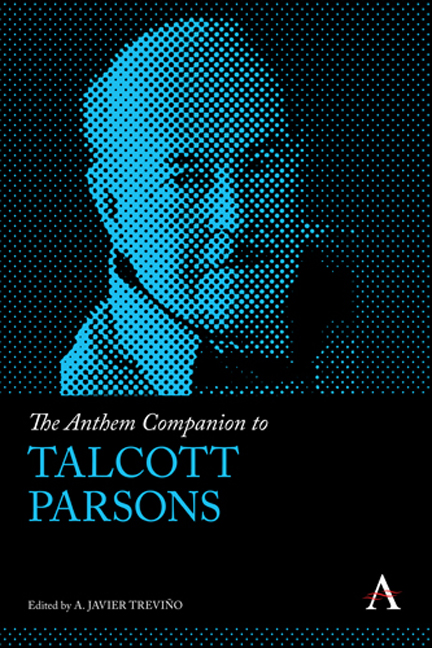Book contents
- Frontmatter
- Content
- Introduction
- Part I Political and Humanist Concerns
- Part II Social Evolution and the American Societal Community
- Chapter Seven Explaining Modernity: Talcott Parsons's Evolutionary Theory and Individualism
- Chapter Eight Talcott Parsons's Historical Analysis and the Cultural–Political Freeze in China: A Reinterpretation
- Chapter Nine Talcott Parsons and American Exceptionalism
- Chapter Ten American Society and the Societal Community: Talcott Parsons, Citizenship and Diversity
- Chapter Eleven Parsons and Nisbet: Two Versions of Sociological Communitarianism
- Contributors
- Index
Chapter Eight - Talcott Parsons's Historical Analysis and the Cultural–Political Freeze in China: A Reinterpretation
from Part II - Social Evolution and the American Societal Community
Published online by Cambridge University Press: 22 July 2017
- Frontmatter
- Content
- Introduction
- Part I Political and Humanist Concerns
- Part II Social Evolution and the American Societal Community
- Chapter Seven Explaining Modernity: Talcott Parsons's Evolutionary Theory and Individualism
- Chapter Eight Talcott Parsons's Historical Analysis and the Cultural–Political Freeze in China: A Reinterpretation
- Chapter Nine Talcott Parsons and American Exceptionalism
- Chapter Ten American Society and the Societal Community: Talcott Parsons, Citizenship and Diversity
- Chapter Eleven Parsons and Nisbet: Two Versions of Sociological Communitarianism
- Contributors
- Index
Summary
During his lifetime Talcott Parsons discussed social development on various levels of analysis of which his theory of social evolution can be regarded as being on the highest level. However, the level of analysis that I will take in this discussion is that of generalized historical development. Contrary to prevailing folklore, Parsons was always highly interested in historical analysis and wrote numerous pieces to that effect. The claim that Parsons ignored historical questions is simply unfounded.
Parsons's interpretation of world history is pointedly presented in his later works and his theoretical outline is summed up in his 1971article “Comparative Studies and Evolutionary Change.” I am here particularly interested in Parsons's notion of “seed-bed society,” although I suggest a different interpretation from the one he presented. I will use this new interpretation to discuss the history of Europe and China in order to indicate why it proved historically impossible for China to launch an industrial revolution and to show how the basic factors, which prohibit an industrial revolution are still haunting China today.
Because of space limitations I have had to leave out supporting documentation. While a more elaborate argumentation would have been prudent, I hope that this compressed presentation will nonetheless serve its purpose.
Parsons's Theory of Social Evolution
Parsons sporadically presented his theory of social evolution and its corresponding historical analysis in various works but it appears particularly prominent during his late period. At the center of Parsons's theory is the concept of differentiation. For Parsons differentiation processes characterize in general all living systems. As he explains, “the concept of differentiation is the basic unifier of the evolutionary and the comparative perspectives.” Parsons mentions cell division in biology as a typical example of what differentiation implies. He also emphasizes that the process is directional; it proceeds in a temporal sequence of “from-to” and as such produces new units that previously did not exist. In this way, Parsons underscores that there is both direction and coherence in the historical process.
Addressing the question of whether history is a random distribution of unique cultures, Parsons said: “But empirically, this simply is not the case; history consists rather, like the system of organic species, of an immensely ramified ‘inverted branching tree’ of forms at many levels of system reference.”
- Type
- Chapter
- Information
- The Anthem Companion to Talcott Parsons , pp. 155 - 176Publisher: Anthem PressPrint publication year: 2016



